BMM3003 Reflective Account: Introduction to Business Operations
VerifiedAdded on 2023/06/11
|10
|3115
|102
AI Summary
This reflective account explores the student's learning journey in business operations and management, focusing on key concepts, strategies, and the role of business management. It begins with reflections on the first semester, detailing the understanding of operational strategies, core competencies, and various elements like production systems and technology. The account then transitions to the second semester, reflecting on the scope of business management, career opportunities, and the application of the Gibbs Model of Evaluation for continuous improvement. The Gibbs Model is used as a framework to analyze experiences, feelings, and future implementation plans, demonstrating a structured approach to reflective practice and learning from both successes and areas for improvement. Desklib provides access to similar assignments and study tools for students.
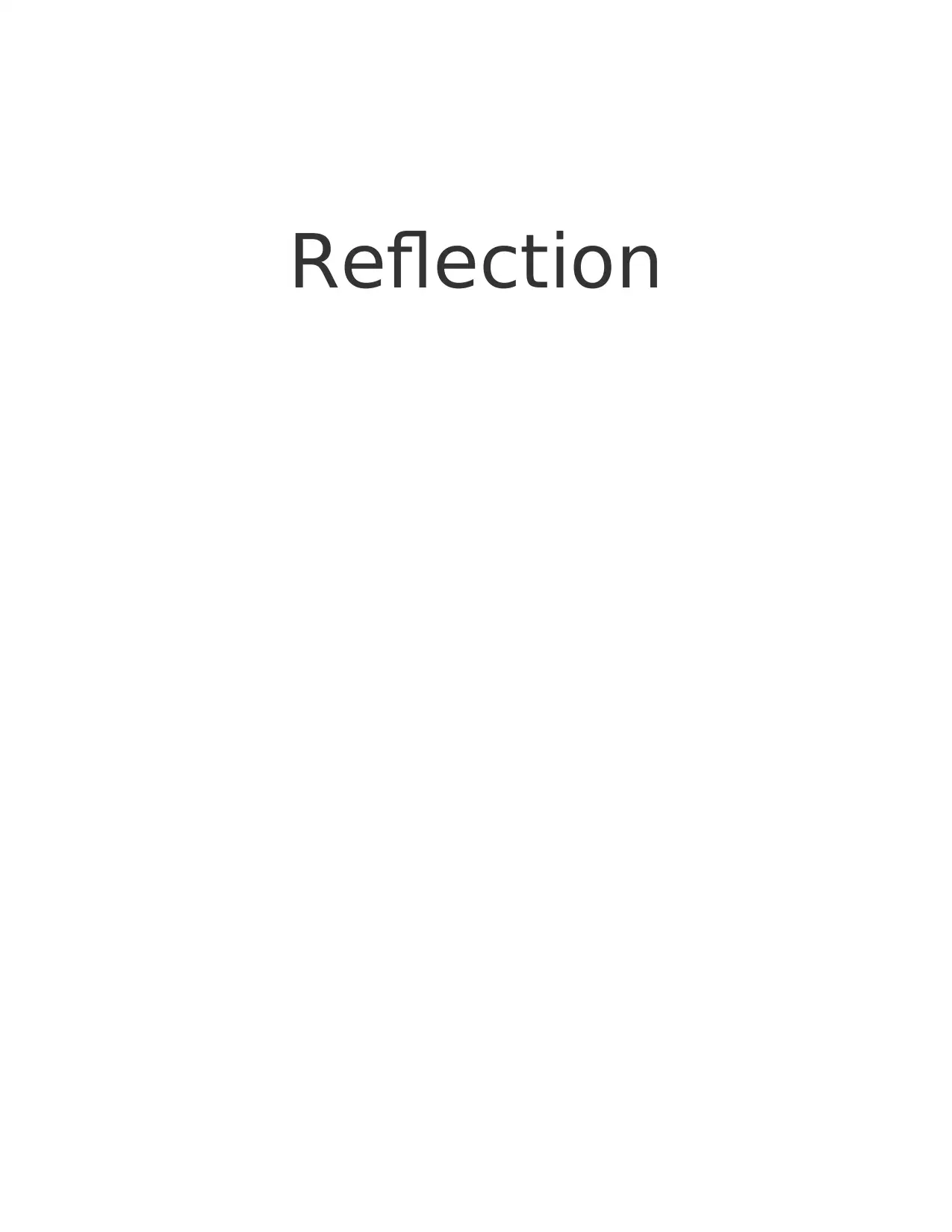
Reflection
Paraphrase This Document
Need a fresh take? Get an instant paraphrase of this document with our AI Paraphraser
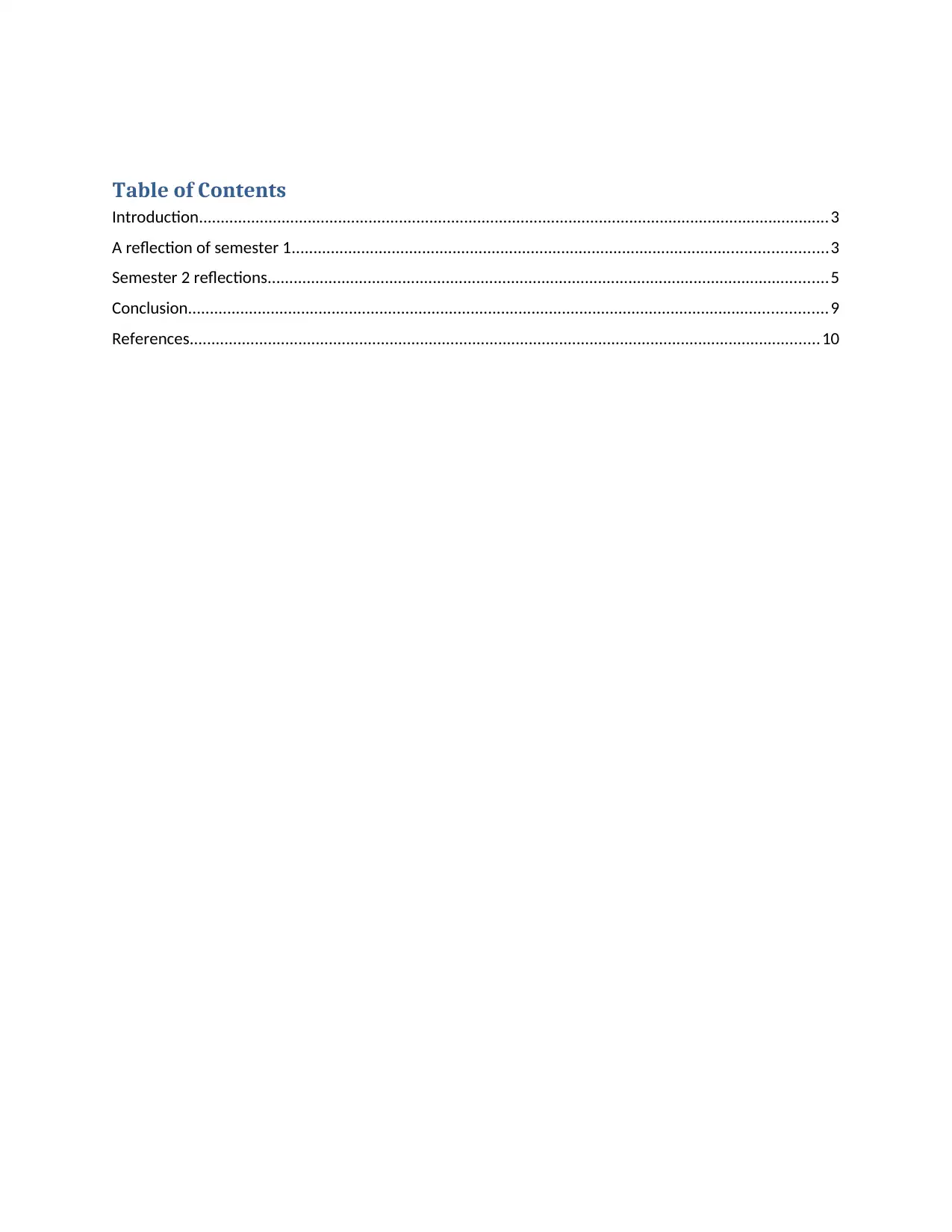
Table of Contents
Introduction.................................................................................................................................................3
A reflection of semester 1...........................................................................................................................3
Semester 2 reflections.................................................................................................................................5
Conclusion...................................................................................................................................................9
References.................................................................................................................................................10
Introduction.................................................................................................................................................3
A reflection of semester 1...........................................................................................................................3
Semester 2 reflections.................................................................................................................................5
Conclusion...................................................................................................................................................9
References.................................................................................................................................................10
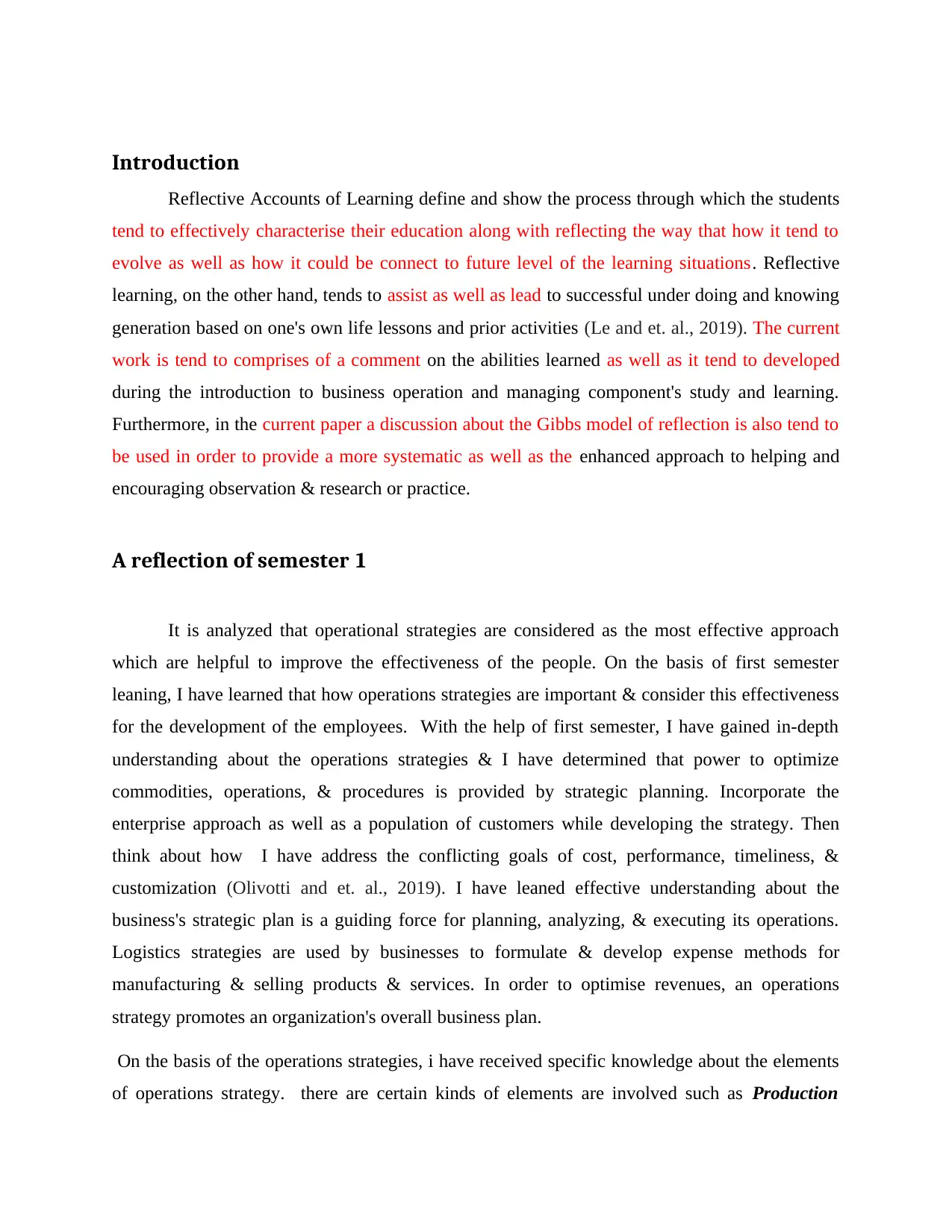
Introduction
Reflective Accounts of Learning define and show the process through which the students
tend to effectively characterise their education along with reflecting the way that how it tend to
evolve as well as how it could be connect to future level of the learning situations. Reflective
learning, on the other hand, tends to assist as well as lead to successful under doing and knowing
generation based on one's own life lessons and prior activities (Le and et. al., 2019). The current
work is tend to comprises of a comment on the abilities learned as well as it tend to developed
during the introduction to business operation and managing component's study and learning.
Furthermore, in the current paper a discussion about the Gibbs model of reflection is also tend to
be used in order to provide a more systematic as well as the enhanced approach to helping and
encouraging observation & research or practice.
A reflection of semester 1
It is analyzed that operational strategies are considered as the most effective approach
which are helpful to improve the effectiveness of the people. On the basis of first semester
leaning, I have learned that how operations strategies are important & consider this effectiveness
for the development of the employees. With the help of first semester, I have gained in-depth
understanding about the operations strategies & I have determined that power to optimize
commodities, operations, & procedures is provided by strategic planning. Incorporate the
enterprise approach as well as a population of customers while developing the strategy. Then
think about how I have address the conflicting goals of cost, performance, timeliness, &
customization (Olivotti and et. al., 2019). I have leaned effective understanding about the
business's strategic plan is a guiding force for planning, analyzing, & executing its operations.
Logistics strategies are used by businesses to formulate & develop expense methods for
manufacturing & selling products & services. In order to optimise revenues, an operations
strategy promotes an organization's overall business plan.
On the basis of the operations strategies, i have received specific knowledge about the elements
of operations strategy. there are certain kinds of elements are involved such as Production
Reflective Accounts of Learning define and show the process through which the students
tend to effectively characterise their education along with reflecting the way that how it tend to
evolve as well as how it could be connect to future level of the learning situations. Reflective
learning, on the other hand, tends to assist as well as lead to successful under doing and knowing
generation based on one's own life lessons and prior activities (Le and et. al., 2019). The current
work is tend to comprises of a comment on the abilities learned as well as it tend to developed
during the introduction to business operation and managing component's study and learning.
Furthermore, in the current paper a discussion about the Gibbs model of reflection is also tend to
be used in order to provide a more systematic as well as the enhanced approach to helping and
encouraging observation & research or practice.
A reflection of semester 1
It is analyzed that operational strategies are considered as the most effective approach
which are helpful to improve the effectiveness of the people. On the basis of first semester
leaning, I have learned that how operations strategies are important & consider this effectiveness
for the development of the employees. With the help of first semester, I have gained in-depth
understanding about the operations strategies & I have determined that power to optimize
commodities, operations, & procedures is provided by strategic planning. Incorporate the
enterprise approach as well as a population of customers while developing the strategy. Then
think about how I have address the conflicting goals of cost, performance, timeliness, &
customization (Olivotti and et. al., 2019). I have leaned effective understanding about the
business's strategic plan is a guiding force for planning, analyzing, & executing its operations.
Logistics strategies are used by businesses to formulate & develop expense methods for
manufacturing & selling products & services. In order to optimise revenues, an operations
strategy promotes an organization's overall business plan.
On the basis of the operations strategies, i have received specific knowledge about the elements
of operations strategy. there are certain kinds of elements are involved such as Production
⊘ This is a preview!⊘
Do you want full access?
Subscribe today to unlock all pages.

Trusted by 1+ million students worldwide
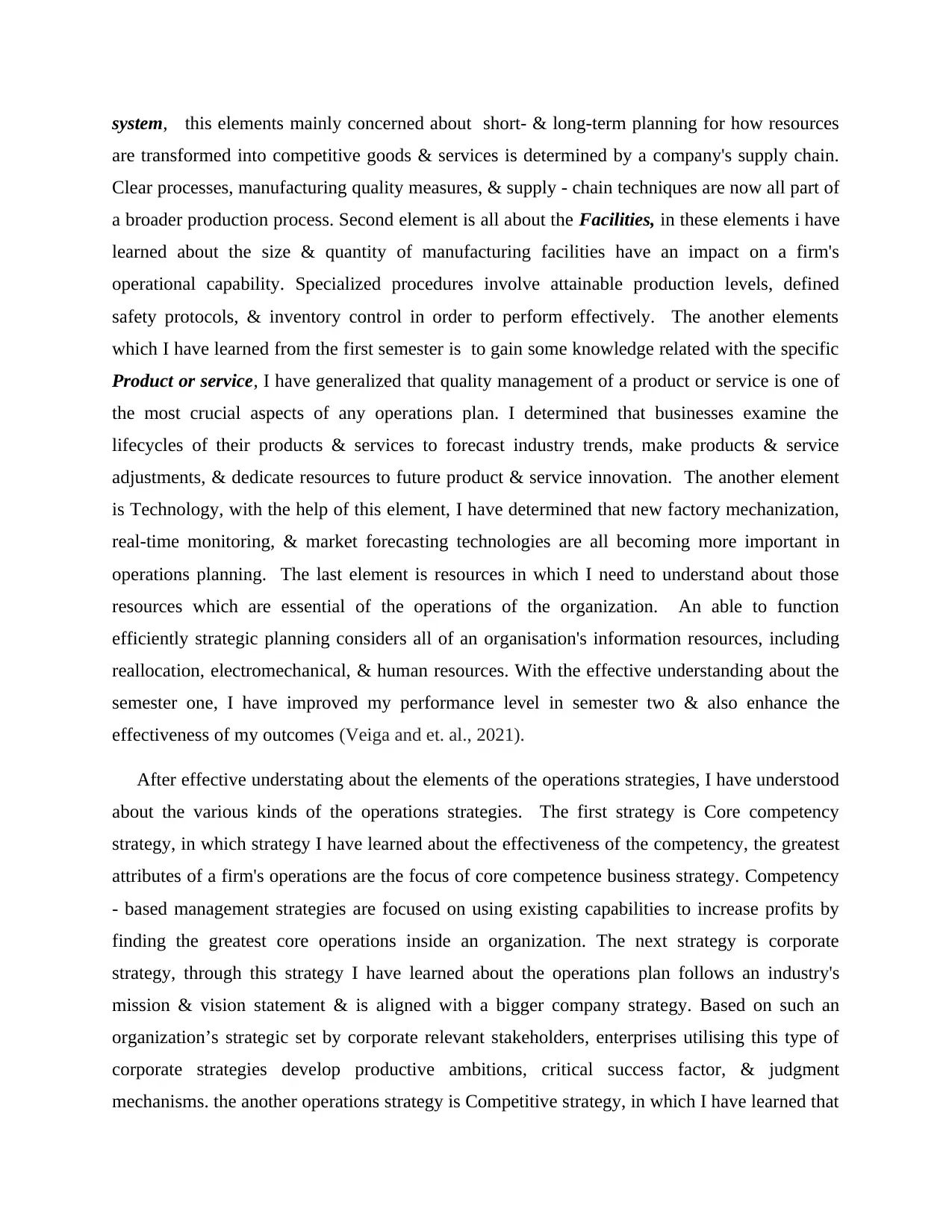
system, this elements mainly concerned about short- & long-term planning for how resources
are transformed into competitive goods & services is determined by a company's supply chain.
Clear processes, manufacturing quality measures, & supply - chain techniques are now all part of
a broader production process. Second element is all about the Facilities, in these elements i have
learned about the size & quantity of manufacturing facilities have an impact on a firm's
operational capability. Specialized procedures involve attainable production levels, defined
safety protocols, & inventory control in order to perform effectively. The another elements
which I have learned from the first semester is to gain some knowledge related with the specific
Product or service, I have generalized that quality management of a product or service is one of
the most crucial aspects of any operations plan. I determined that businesses examine the
lifecycles of their products & services to forecast industry trends, make products & service
adjustments, & dedicate resources to future product & service innovation. The another element
is Technology, with the help of this element, I have determined that new factory mechanization,
real-time monitoring, & market forecasting technologies are all becoming more important in
operations planning. The last element is resources in which I need to understand about those
resources which are essential of the operations of the organization. An able to function
efficiently strategic planning considers all of an organisation's information resources, including
reallocation, electromechanical, & human resources. With the effective understanding about the
semester one, I have improved my performance level in semester two & also enhance the
effectiveness of my outcomes (Veiga and et. al., 2021).
After effective understating about the elements of the operations strategies, I have understood
about the various kinds of the operations strategies. The first strategy is Core competency
strategy, in which strategy I have learned about the effectiveness of the competency, the greatest
attributes of a firm's operations are the focus of core competence business strategy. Competency
- based management strategies are focused on using existing capabilities to increase profits by
finding the greatest core operations inside an organization. The next strategy is corporate
strategy, through this strategy I have learned about the operations plan follows an industry's
mission & vision statement & is aligned with a bigger company strategy. Based on such an
organization’s strategic set by corporate relevant stakeholders, enterprises utilising this type of
corporate strategies develop productive ambitions, critical success factor, & judgment
mechanisms. the another operations strategy is Competitive strategy, in which I have learned that
are transformed into competitive goods & services is determined by a company's supply chain.
Clear processes, manufacturing quality measures, & supply - chain techniques are now all part of
a broader production process. Second element is all about the Facilities, in these elements i have
learned about the size & quantity of manufacturing facilities have an impact on a firm's
operational capability. Specialized procedures involve attainable production levels, defined
safety protocols, & inventory control in order to perform effectively. The another elements
which I have learned from the first semester is to gain some knowledge related with the specific
Product or service, I have generalized that quality management of a product or service is one of
the most crucial aspects of any operations plan. I determined that businesses examine the
lifecycles of their products & services to forecast industry trends, make products & service
adjustments, & dedicate resources to future product & service innovation. The another element
is Technology, with the help of this element, I have determined that new factory mechanization,
real-time monitoring, & market forecasting technologies are all becoming more important in
operations planning. The last element is resources in which I need to understand about those
resources which are essential of the operations of the organization. An able to function
efficiently strategic planning considers all of an organisation's information resources, including
reallocation, electromechanical, & human resources. With the effective understanding about the
semester one, I have improved my performance level in semester two & also enhance the
effectiveness of my outcomes (Veiga and et. al., 2021).
After effective understating about the elements of the operations strategies, I have understood
about the various kinds of the operations strategies. The first strategy is Core competency
strategy, in which strategy I have learned about the effectiveness of the competency, the greatest
attributes of a firm's operations are the focus of core competence business strategy. Competency
- based management strategies are focused on using existing capabilities to increase profits by
finding the greatest core operations inside an organization. The next strategy is corporate
strategy, through this strategy I have learned about the operations plan follows an industry's
mission & vision statement & is aligned with a bigger company strategy. Based on such an
organization’s strategic set by corporate relevant stakeholders, enterprises utilising this type of
corporate strategies develop productive ambitions, critical success factor, & judgment
mechanisms. the another operations strategy is Competitive strategy, in which I have learned that
Paraphrase This Document
Need a fresh take? Get an instant paraphrase of this document with our AI Paraphraser
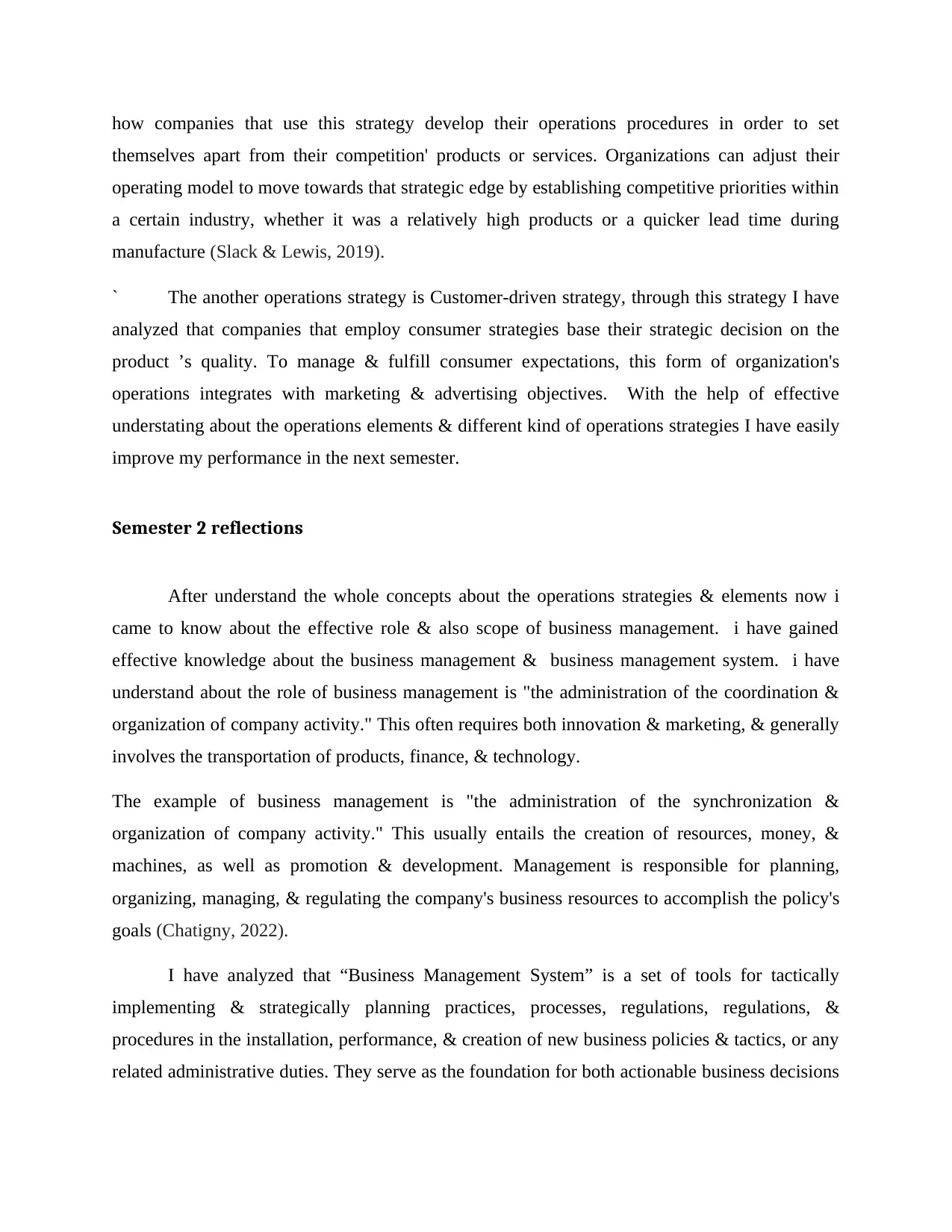
how companies that use this strategy develop their operations procedures in order to set
themselves apart from their competition' products or services. Organizations can adjust their
operating model to move towards that strategic edge by establishing competitive priorities within
a certain industry, whether it was a relatively high products or a quicker lead time during
manufacture (Slack & Lewis, 2019).
` The another operations strategy is Customer-driven strategy, through this strategy I have
analyzed that companies that employ consumer strategies base their strategic decision on the
product ’s quality. To manage & fulfill consumer expectations, this form of organization's
operations integrates with marketing & advertising objectives. With the help of effective
understating about the operations elements & different kind of operations strategies I have easily
improve my performance in the next semester.
Semester 2 reflections
After understand the whole concepts about the operations strategies & elements now i
came to know about the effective role & also scope of business management. i have gained
effective knowledge about the business management & business management system. i have
understand about the role of business management is "the administration of the coordination &
organization of company activity." This often requires both innovation & marketing, & generally
involves the transportation of products, finance, & technology.
The example of business management is "the administration of the synchronization &
organization of company activity." This usually entails the creation of resources, money, &
machines, as well as promotion & development. Management is responsible for planning,
organizing, managing, & regulating the company's business resources to accomplish the policy's
goals (Chatigny, 2022).
I have analyzed that “Business Management System” is a set of tools for tactically
implementing & strategically planning practices, processes, regulations, regulations, &
procedures in the installation, performance, & creation of new business policies & tactics, or any
related administrative duties. They serve as the foundation for both actionable business decisions
themselves apart from their competition' products or services. Organizations can adjust their
operating model to move towards that strategic edge by establishing competitive priorities within
a certain industry, whether it was a relatively high products or a quicker lead time during
manufacture (Slack & Lewis, 2019).
` The another operations strategy is Customer-driven strategy, through this strategy I have
analyzed that companies that employ consumer strategies base their strategic decision on the
product ’s quality. To manage & fulfill consumer expectations, this form of organization's
operations integrates with marketing & advertising objectives. With the help of effective
understating about the operations elements & different kind of operations strategies I have easily
improve my performance in the next semester.
Semester 2 reflections
After understand the whole concepts about the operations strategies & elements now i
came to know about the effective role & also scope of business management. i have gained
effective knowledge about the business management & business management system. i have
understand about the role of business management is "the administration of the coordination &
organization of company activity." This often requires both innovation & marketing, & generally
involves the transportation of products, finance, & technology.
The example of business management is "the administration of the synchronization &
organization of company activity." This usually entails the creation of resources, money, &
machines, as well as promotion & development. Management is responsible for planning,
organizing, managing, & regulating the company's business resources to accomplish the policy's
goals (Chatigny, 2022).
I have analyzed that “Business Management System” is a set of tools for tactically
implementing & strategically planning practices, processes, regulations, regulations, &
procedures in the installation, performance, & creation of new business policies & tactics, or any
related administrative duties. They serve as the foundation for both actionable business decisions
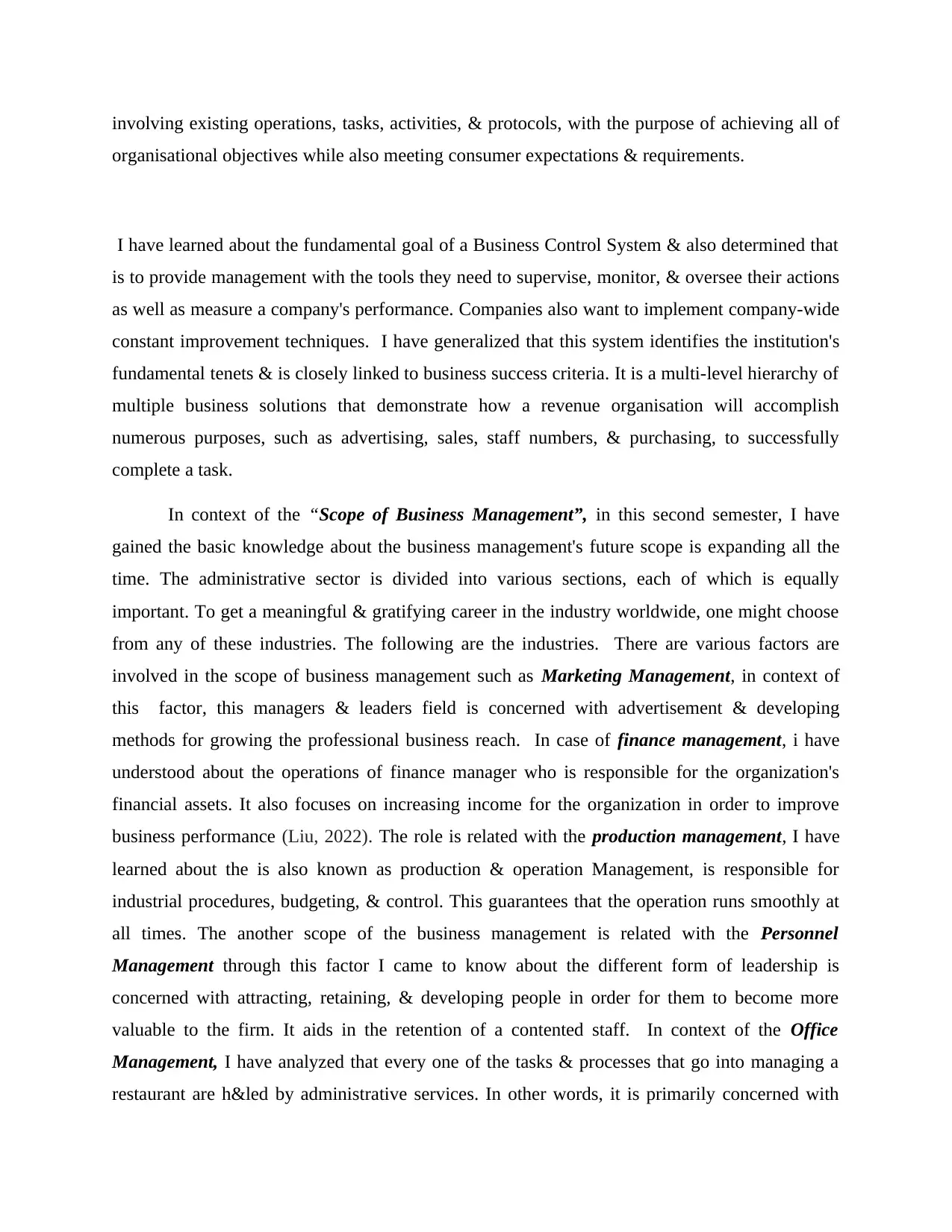
involving existing operations, tasks, activities, & protocols, with the purpose of achieving all of
organisational objectives while also meeting consumer expectations & requirements.
I have learned about the fundamental goal of a Business Control System & also determined that
is to provide management with the tools they need to supervise, monitor, & oversee their actions
as well as measure a company's performance. Companies also want to implement company-wide
constant improvement techniques. I have generalized that this system identifies the institution's
fundamental tenets & is closely linked to business success criteria. It is a multi-level hierarchy of
multiple business solutions that demonstrate how a revenue organisation will accomplish
numerous purposes, such as advertising, sales, staff numbers, & purchasing, to successfully
complete a task.
In context of the “Scope of Business Management”, in this second semester, I have
gained the basic knowledge about the business management's future scope is expanding all the
time. The administrative sector is divided into various sections, each of which is equally
important. To get a meaningful & gratifying career in the industry worldwide, one might choose
from any of these industries. The following are the industries. There are various factors are
involved in the scope of business management such as Marketing Management, in context of
this factor, this managers & leaders field is concerned with advertisement & developing
methods for growing the professional business reach. In case of finance management, i have
understood about the operations of finance manager who is responsible for the organization's
financial assets. It also focuses on increasing income for the organization in order to improve
business performance (Liu, 2022). The role is related with the production management, I have
learned about the is also known as production & operation Management, is responsible for
industrial procedures, budgeting, & control. This guarantees that the operation runs smoothly at
all times. The another scope of the business management is related with the Personnel
Management through this factor I came to know about the different form of leadership is
concerned with attracting, retaining, & developing people in order for them to become more
valuable to the firm. It aids in the retention of a contented staff. In context of the Office
Management, I have analyzed that every one of the tasks & processes that go into managing a
restaurant are h&led by administrative services. In other words, it is primarily concerned with
organisational objectives while also meeting consumer expectations & requirements.
I have learned about the fundamental goal of a Business Control System & also determined that
is to provide management with the tools they need to supervise, monitor, & oversee their actions
as well as measure a company's performance. Companies also want to implement company-wide
constant improvement techniques. I have generalized that this system identifies the institution's
fundamental tenets & is closely linked to business success criteria. It is a multi-level hierarchy of
multiple business solutions that demonstrate how a revenue organisation will accomplish
numerous purposes, such as advertising, sales, staff numbers, & purchasing, to successfully
complete a task.
In context of the “Scope of Business Management”, in this second semester, I have
gained the basic knowledge about the business management's future scope is expanding all the
time. The administrative sector is divided into various sections, each of which is equally
important. To get a meaningful & gratifying career in the industry worldwide, one might choose
from any of these industries. The following are the industries. There are various factors are
involved in the scope of business management such as Marketing Management, in context of
this factor, this managers & leaders field is concerned with advertisement & developing
methods for growing the professional business reach. In case of finance management, i have
understood about the operations of finance manager who is responsible for the organization's
financial assets. It also focuses on increasing income for the organization in order to improve
business performance (Liu, 2022). The role is related with the production management, I have
learned about the is also known as production & operation Management, is responsible for
industrial procedures, budgeting, & control. This guarantees that the operation runs smoothly at
all times. The another scope of the business management is related with the Personnel
Management through this factor I came to know about the different form of leadership is
concerned with attracting, retaining, & developing people in order for them to become more
valuable to the firm. It aids in the retention of a contented staff. In context of the Office
Management, I have analyzed that every one of the tasks & processes that go into managing a
restaurant are h&led by administrative services. In other words, it is primarily concerned with
⊘ This is a preview!⊘
Do you want full access?
Subscribe today to unlock all pages.

Trusted by 1+ million students worldwide
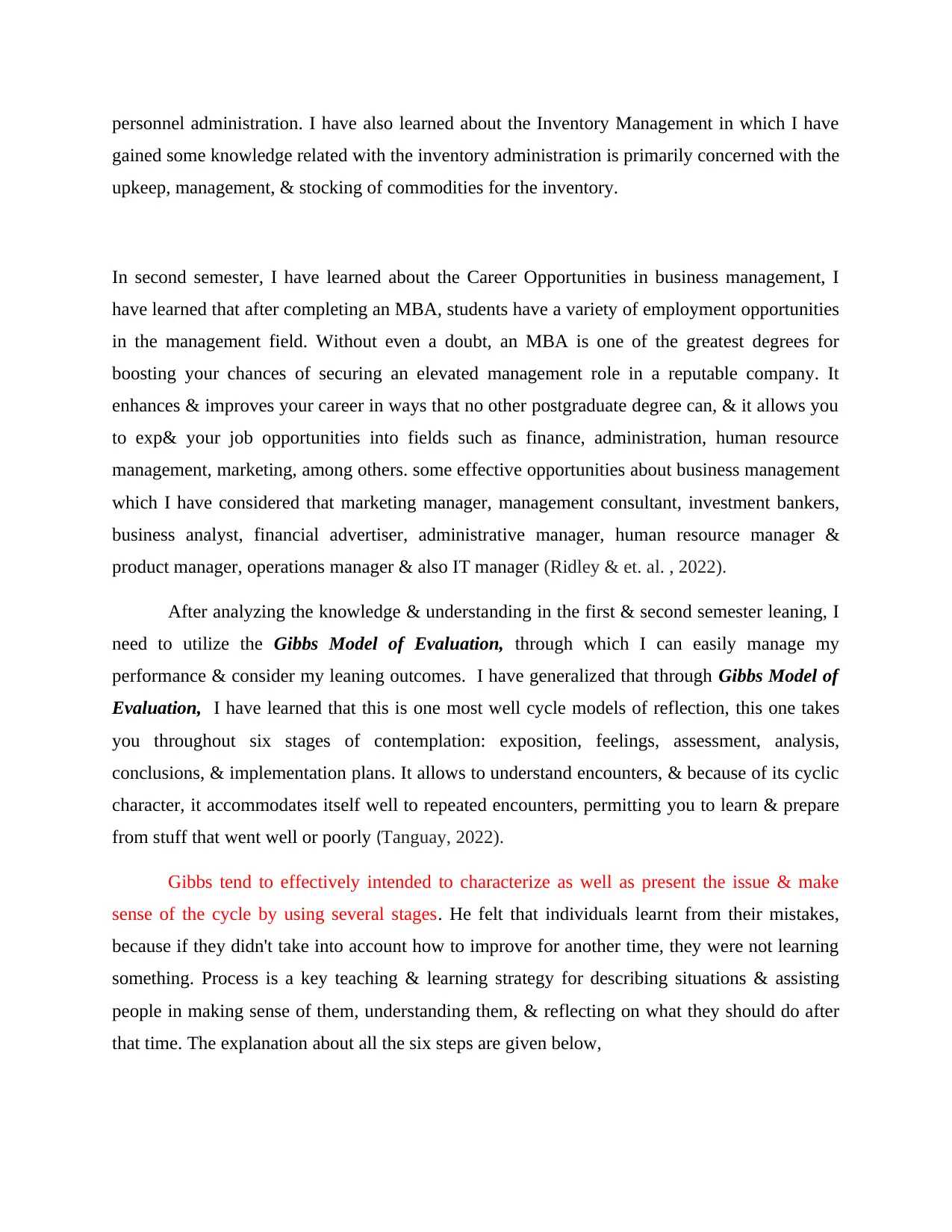
personnel administration. I have also learned about the Inventory Management in which I have
gained some knowledge related with the inventory administration is primarily concerned with the
upkeep, management, & stocking of commodities for the inventory.
In second semester, I have learned about the Career Opportunities in business management, I
have learned that after completing an MBA, students have a variety of employment opportunities
in the management field. Without even a doubt, an MBA is one of the greatest degrees for
boosting your chances of securing an elevated management role in a reputable company. It
enhances & improves your career in ways that no other postgraduate degree can, & it allows you
to exp& your job opportunities into fields such as finance, administration, human resource
management, marketing, among others. some effective opportunities about business management
which I have considered that marketing manager, management consultant, investment bankers,
business analyst, financial advertiser, administrative manager, human resource manager &
product manager, operations manager & also IT manager (Ridley & et. al. , 2022).
After analyzing the knowledge & understanding in the first & second semester leaning, I
need to utilize the Gibbs Model of Evaluation, through which I can easily manage my
performance & consider my leaning outcomes. I have generalized that through Gibbs Model of
Evaluation, I have learned that this is one most well cycle models of reflection, this one takes
you throughout six stages of contemplation: exposition, feelings, assessment, analysis,
conclusions, & implementation plans. It allows to understand encounters, & because of its cyclic
character, it accommodates itself well to repeated encounters, permitting you to learn & prepare
from stuff that went well or poorly (Tanguay, 2022).
Gibbs tend to effectively intended to characterize as well as present the issue & make
sense of the cycle by using several stages. He felt that individuals learnt from their mistakes,
because if they didn't take into account how to improve for another time, they were not learning
something. Process is a key teaching & learning strategy for describing situations & assisting
people in making sense of them, understanding them, & reflecting on what they should do after
that time. The explanation about all the six steps are given below,
gained some knowledge related with the inventory administration is primarily concerned with the
upkeep, management, & stocking of commodities for the inventory.
In second semester, I have learned about the Career Opportunities in business management, I
have learned that after completing an MBA, students have a variety of employment opportunities
in the management field. Without even a doubt, an MBA is one of the greatest degrees for
boosting your chances of securing an elevated management role in a reputable company. It
enhances & improves your career in ways that no other postgraduate degree can, & it allows you
to exp& your job opportunities into fields such as finance, administration, human resource
management, marketing, among others. some effective opportunities about business management
which I have considered that marketing manager, management consultant, investment bankers,
business analyst, financial advertiser, administrative manager, human resource manager &
product manager, operations manager & also IT manager (Ridley & et. al. , 2022).
After analyzing the knowledge & understanding in the first & second semester leaning, I
need to utilize the Gibbs Model of Evaluation, through which I can easily manage my
performance & consider my leaning outcomes. I have generalized that through Gibbs Model of
Evaluation, I have learned that this is one most well cycle models of reflection, this one takes
you throughout six stages of contemplation: exposition, feelings, assessment, analysis,
conclusions, & implementation plans. It allows to understand encounters, & because of its cyclic
character, it accommodates itself well to repeated encounters, permitting you to learn & prepare
from stuff that went well or poorly (Tanguay, 2022).
Gibbs tend to effectively intended to characterize as well as present the issue & make
sense of the cycle by using several stages. He felt that individuals learnt from their mistakes,
because if they didn't take into account how to improve for another time, they were not learning
something. Process is a key teaching & learning strategy for describing situations & assisting
people in making sense of them, understanding them, & reflecting on what they should do after
that time. The explanation about all the six steps are given below,
Paraphrase This Document
Need a fresh take? Get an instant paraphrase of this document with our AI Paraphraser
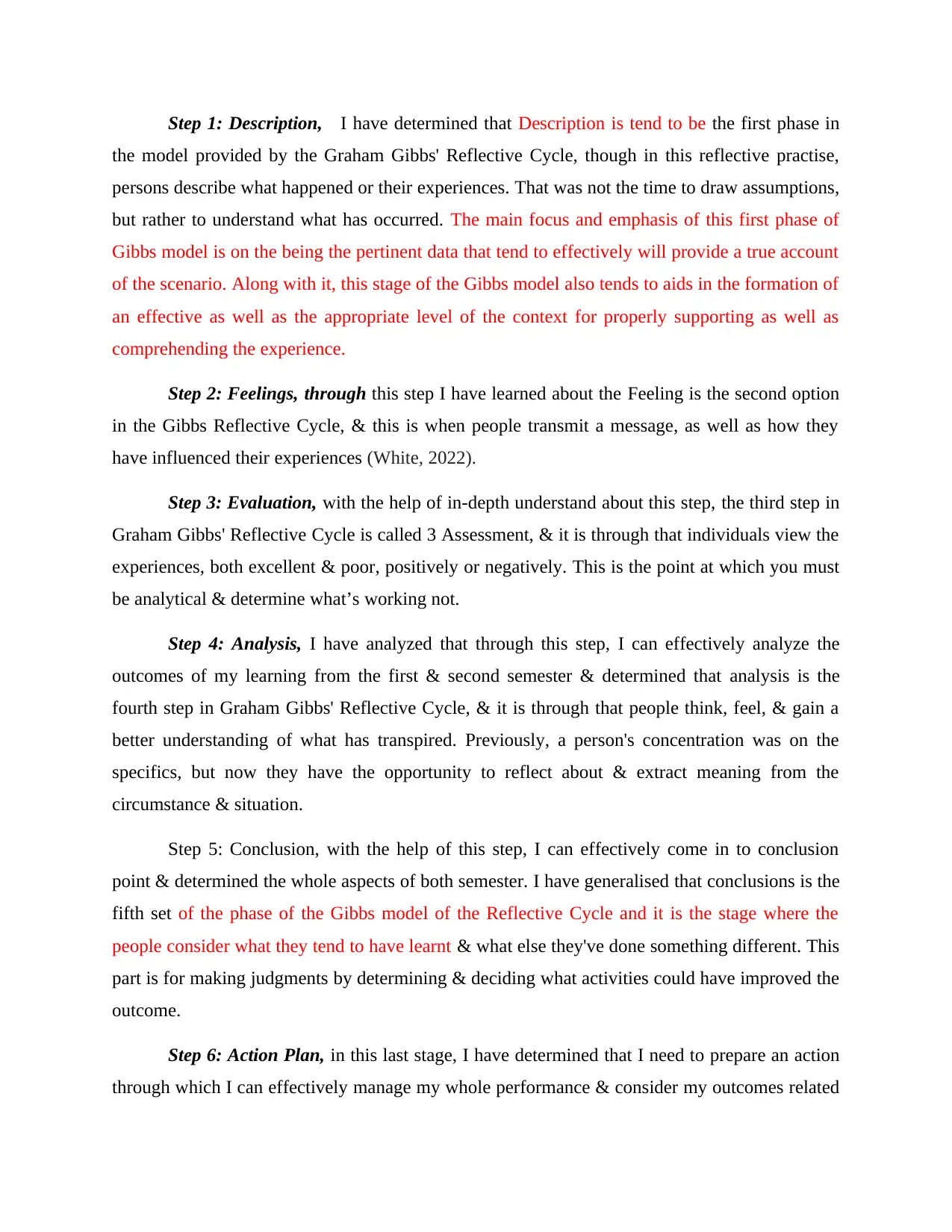
Step 1: Description, I have determined that Description is tend to be the first phase in
the model provided by the Graham Gibbs' Reflective Cycle, though in this reflective practise,
persons describe what happened or their experiences. That was not the time to draw assumptions,
but rather to understand what has occurred. The main focus and emphasis of this first phase of
Gibbs model is on the being the pertinent data that tend to effectively will provide a true account
of the scenario. Along with it, this stage of the Gibbs model also tends to aids in the formation of
an effective as well as the appropriate level of the context for properly supporting as well as
comprehending the experience.
Step 2: Feelings, through this step I have learned about the Feeling is the second option
in the Gibbs Reflective Cycle, & this is when people transmit a message, as well as how they
have influenced their experiences (White, 2022).
Step 3: Evaluation, with the help of in-depth understand about this step, the third step in
Graham Gibbs' Reflective Cycle is called 3 Assessment, & it is through that individuals view the
experiences, both excellent & poor, positively or negatively. This is the point at which you must
be analytical & determine what’s working not.
Step 4: Analysis, I have analyzed that through this step, I can effectively analyze the
outcomes of my learning from the first & second semester & determined that analysis is the
fourth step in Graham Gibbs' Reflective Cycle, & it is through that people think, feel, & gain a
better understanding of what has transpired. Previously, a person's concentration was on the
specifics, but now they have the opportunity to reflect about & extract meaning from the
circumstance & situation.
Step 5: Conclusion, with the help of this step, I can effectively come in to conclusion
point & determined the whole aspects of both semester. I have generalised that conclusions is the
fifth set of the phase of the Gibbs model of the Reflective Cycle and it is the stage where the
people consider what they tend to have learnt & what else they've done something different. This
part is for making judgments by determining & deciding what activities could have improved the
outcome.
Step 6: Action Plan, in this last stage, I have determined that I need to prepare an action
through which I can effectively manage my whole performance & consider my outcomes related
the model provided by the Graham Gibbs' Reflective Cycle, though in this reflective practise,
persons describe what happened or their experiences. That was not the time to draw assumptions,
but rather to understand what has occurred. The main focus and emphasis of this first phase of
Gibbs model is on the being the pertinent data that tend to effectively will provide a true account
of the scenario. Along with it, this stage of the Gibbs model also tends to aids in the formation of
an effective as well as the appropriate level of the context for properly supporting as well as
comprehending the experience.
Step 2: Feelings, through this step I have learned about the Feeling is the second option
in the Gibbs Reflective Cycle, & this is when people transmit a message, as well as how they
have influenced their experiences (White, 2022).
Step 3: Evaluation, with the help of in-depth understand about this step, the third step in
Graham Gibbs' Reflective Cycle is called 3 Assessment, & it is through that individuals view the
experiences, both excellent & poor, positively or negatively. This is the point at which you must
be analytical & determine what’s working not.
Step 4: Analysis, I have analyzed that through this step, I can effectively analyze the
outcomes of my learning from the first & second semester & determined that analysis is the
fourth step in Graham Gibbs' Reflective Cycle, & it is through that people think, feel, & gain a
better understanding of what has transpired. Previously, a person's concentration was on the
specifics, but now they have the opportunity to reflect about & extract meaning from the
circumstance & situation.
Step 5: Conclusion, with the help of this step, I can effectively come in to conclusion
point & determined the whole aspects of both semester. I have generalised that conclusions is the
fifth set of the phase of the Gibbs model of the Reflective Cycle and it is the stage where the
people consider what they tend to have learnt & what else they've done something different. This
part is for making judgments by determining & deciding what activities could have improved the
outcome.
Step 6: Action Plan, in this last stage, I have determined that I need to prepare an action
through which I can effectively manage my whole performance & consider my outcomes related
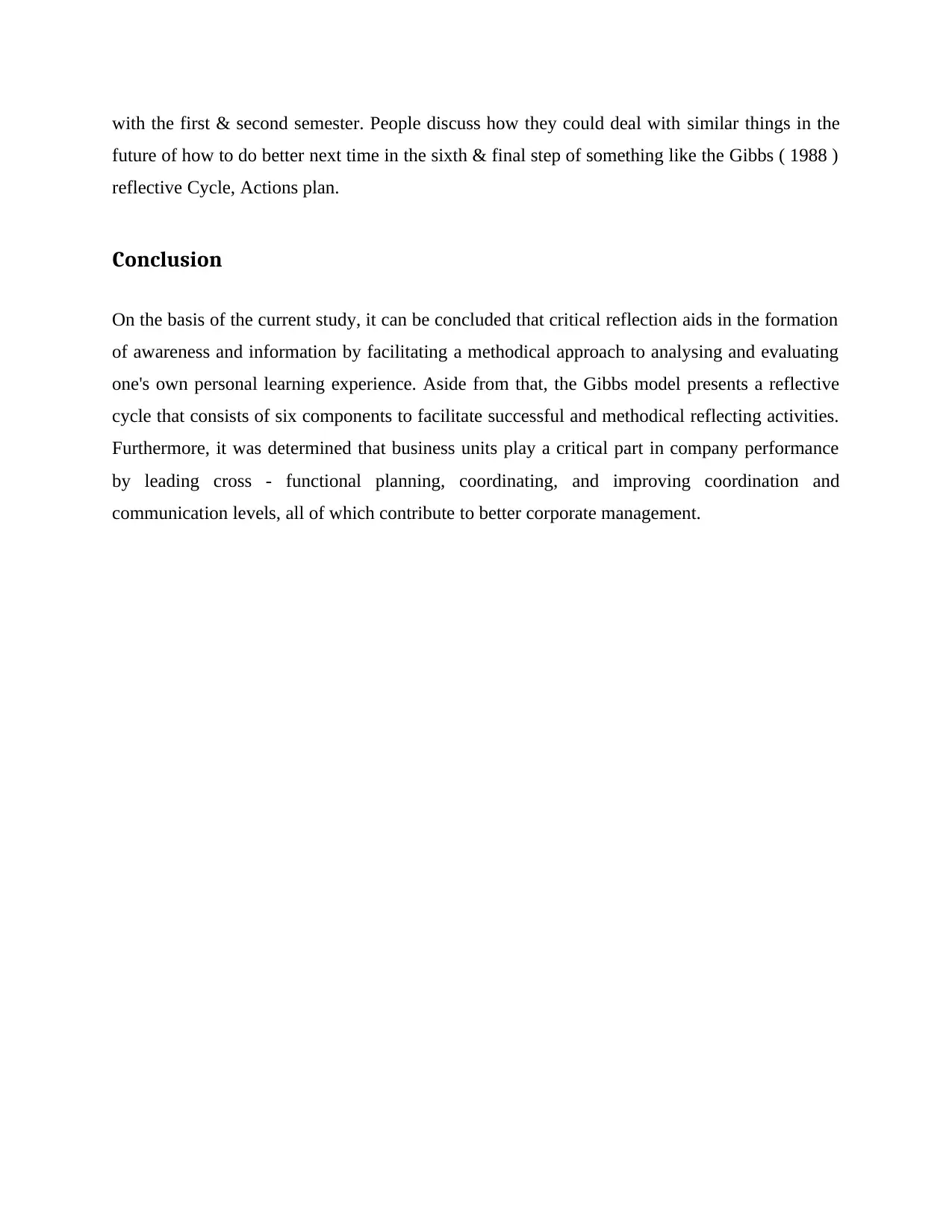
with the first & second semester. People discuss how they could deal with similar things in the
future of how to do better next time in the sixth & final step of something like the Gibbs ( 1988 )
reflective Cycle, Actions plan.
Conclusion
On the basis of the current study, it can be concluded that critical reflection aids in the formation
of awareness and information by facilitating a methodical approach to analysing and evaluating
one's own personal learning experience. Aside from that, the Gibbs model presents a reflective
cycle that consists of six components to facilitate successful and methodical reflecting activities.
Furthermore, it was determined that business units play a critical part in company performance
by leading cross - functional planning, coordinating, and improving coordination and
communication levels, all of which contribute to better corporate management.
future of how to do better next time in the sixth & final step of something like the Gibbs ( 1988 )
reflective Cycle, Actions plan.
Conclusion
On the basis of the current study, it can be concluded that critical reflection aids in the formation
of awareness and information by facilitating a methodical approach to analysing and evaluating
one's own personal learning experience. Aside from that, the Gibbs model presents a reflective
cycle that consists of six components to facilitate successful and methodical reflecting activities.
Furthermore, it was determined that business units play a critical part in company performance
by leading cross - functional planning, coordinating, and improving coordination and
communication levels, all of which contribute to better corporate management.
⊘ This is a preview!⊘
Do you want full access?
Subscribe today to unlock all pages.

Trusted by 1+ million students worldwide
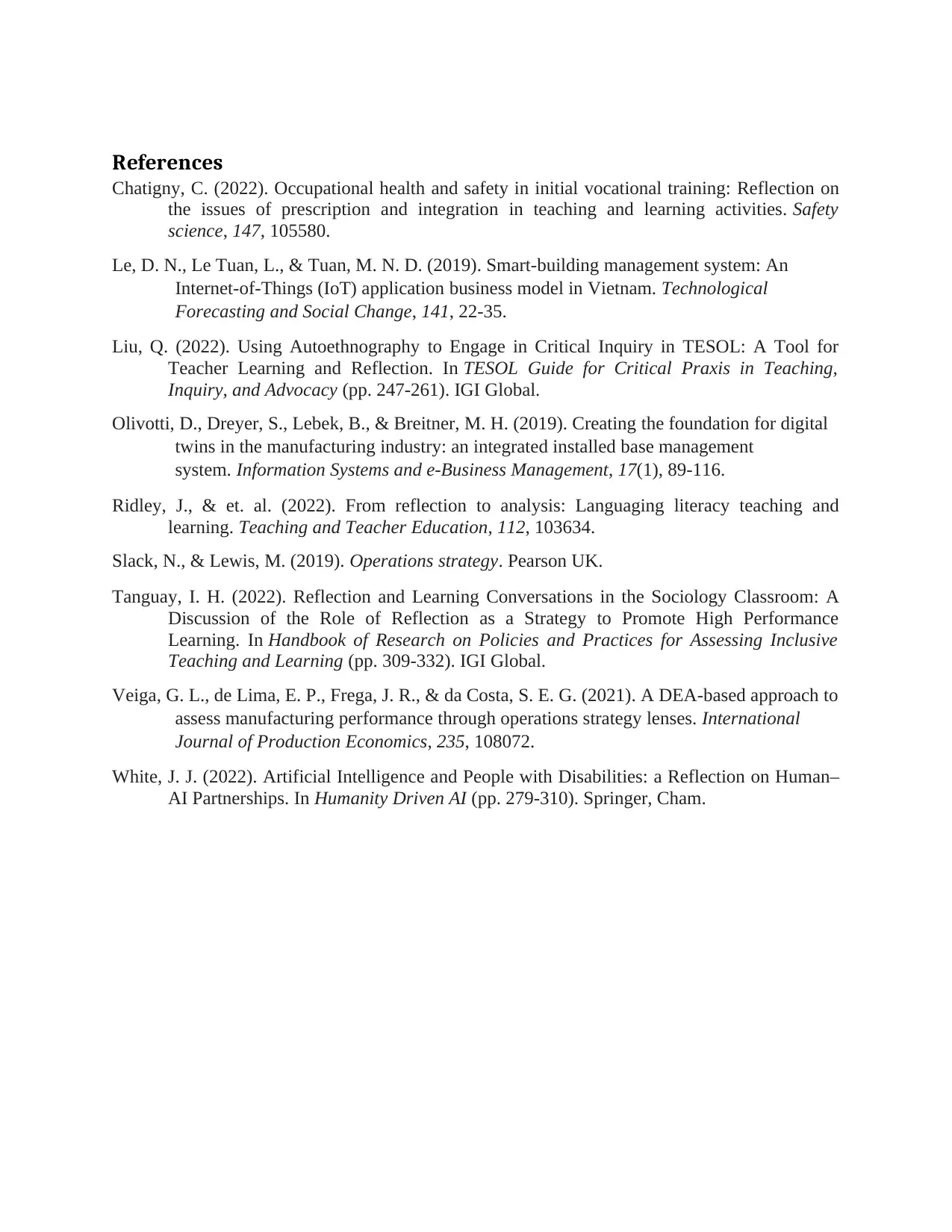
References
Chatigny, C. (2022). Occupational health and safety in initial vocational training: Reflection on
the issues of prescription and integration in teaching and learning activities. Safety
science, 147, 105580.
Le, D. N., Le Tuan, L., & Tuan, M. N. D. (2019). Smart-building management system: An
Internet-of-Things (IoT) application business model in Vietnam. Technological
Forecasting and Social Change, 141, 22-35.
Liu, Q. (2022). Using Autoethnography to Engage in Critical Inquiry in TESOL: A Tool for
Teacher Learning and Reflection. In TESOL Guide for Critical Praxis in Teaching,
Inquiry, and Advocacy (pp. 247-261). IGI Global.
Olivotti, D., Dreyer, S., Lebek, B., & Breitner, M. H. (2019). Creating the foundation for digital
twins in the manufacturing industry: an integrated installed base management
system. Information Systems and e-Business Management, 17(1), 89-116.
Ridley, J., & et. al. (2022). From reflection to analysis: Languaging literacy teaching and
learning. Teaching and Teacher Education, 112, 103634.
Slack, N., & Lewis, M. (2019). Operations strategy. Pearson UK.
Tanguay, I. H. (2022). Reflection and Learning Conversations in the Sociology Classroom: A
Discussion of the Role of Reflection as a Strategy to Promote High Performance
Learning. In Handbook of Research on Policies and Practices for Assessing Inclusive
Teaching and Learning (pp. 309-332). IGI Global.
Veiga, G. L., de Lima, E. P., Frega, J. R., & da Costa, S. E. G. (2021). A DEA-based approach to
assess manufacturing performance through operations strategy lenses. International
Journal of Production Economics, 235, 108072.
White, J. J. (2022). Artificial Intelligence and People with Disabilities: a Reflection on Human–
AI Partnerships. In Humanity Driven AI (pp. 279-310). Springer, Cham.
Chatigny, C. (2022). Occupational health and safety in initial vocational training: Reflection on
the issues of prescription and integration in teaching and learning activities. Safety
science, 147, 105580.
Le, D. N., Le Tuan, L., & Tuan, M. N. D. (2019). Smart-building management system: An
Internet-of-Things (IoT) application business model in Vietnam. Technological
Forecasting and Social Change, 141, 22-35.
Liu, Q. (2022). Using Autoethnography to Engage in Critical Inquiry in TESOL: A Tool for
Teacher Learning and Reflection. In TESOL Guide for Critical Praxis in Teaching,
Inquiry, and Advocacy (pp. 247-261). IGI Global.
Olivotti, D., Dreyer, S., Lebek, B., & Breitner, M. H. (2019). Creating the foundation for digital
twins in the manufacturing industry: an integrated installed base management
system. Information Systems and e-Business Management, 17(1), 89-116.
Ridley, J., & et. al. (2022). From reflection to analysis: Languaging literacy teaching and
learning. Teaching and Teacher Education, 112, 103634.
Slack, N., & Lewis, M. (2019). Operations strategy. Pearson UK.
Tanguay, I. H. (2022). Reflection and Learning Conversations in the Sociology Classroom: A
Discussion of the Role of Reflection as a Strategy to Promote High Performance
Learning. In Handbook of Research on Policies and Practices for Assessing Inclusive
Teaching and Learning (pp. 309-332). IGI Global.
Veiga, G. L., de Lima, E. P., Frega, J. R., & da Costa, S. E. G. (2021). A DEA-based approach to
assess manufacturing performance through operations strategy lenses. International
Journal of Production Economics, 235, 108072.
White, J. J. (2022). Artificial Intelligence and People with Disabilities: a Reflection on Human–
AI Partnerships. In Humanity Driven AI (pp. 279-310). Springer, Cham.
1 out of 10
Related Documents
Your All-in-One AI-Powered Toolkit for Academic Success.
+13062052269
info@desklib.com
Available 24*7 on WhatsApp / Email
![[object Object]](/_next/static/media/star-bottom.7253800d.svg)
Unlock your academic potential
Copyright © 2020–2026 A2Z Services. All Rights Reserved. Developed and managed by ZUCOL.





